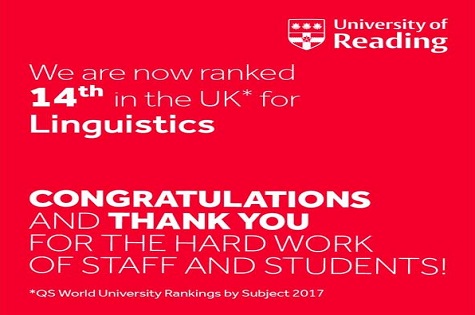 Linguistics at the University of Reading has been ranked as 14th in the UK in the QS World University Rankings by Subject 2017.
Linguistics at the University of Reading has been ranked as 14th in the UK in the QS World University Rankings by Subject 2017.
Theo Marinis, Director of the Centre for Literacy & Multilingualism (CeLM), commented that: ‘This ranking reflects the vibrant linguistics environment at the University of Reading that leads to cutting edge research. Linguists are based within a range of Departments and Schools, including the Department of English Language & Applied Linguistics, The School of Psychology & Clinical Language Sciences, the Department of Modern Languages & European Studies, and the Institute of Education.
The Centre for Literacy & Multilingualism provides a hub for linguistics at the University of Reading and enables cross-fertilisation across disciplines of linguistics with education, classics, geography, psychology, neuroscience, and speech and language therapy.’
CeLM conducts, coordinates, and disseminates world-leading research on literacy and multilingualism that draw on all these disciplines. For example, current projects include:
- Research into bi-literacy effects on language and cognition in bilingual aphasia aims to determine whether bi-literacy provides a cognitive and linguistic advantage for healthy bilingual individuals as well as individual recovering from post-stroke aphasia.
- Linguistic Creativity in Language Learning investigates the impact on language learning of the use of different kinds of written texts (literary and non-literary) in French and German. It will also compare functional teaching approaches and ones that involve creative personal responses from learners such as drama and creative writing and aims to inform language curriculum design, language education policy and classroom practice.
We are looking at whether linguistic similarities at word and sentence level between languages have an effect on language production in bi/multilingual aphasic patients and healthy bi/multilingual controls.


